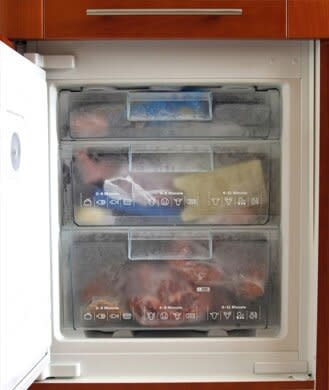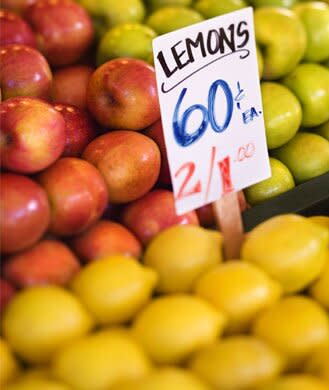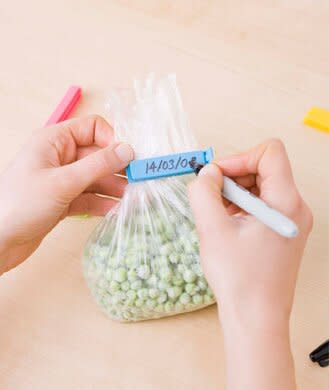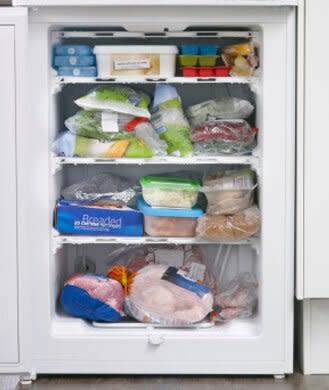6 Secrets to Make Fresh Foods Last Longer
When we're doing that weekly purge of spoiled foods in the fridge, it seems like we're tossing our money along with it-especially when it comes to the fresh, healthy items that cost the most and sour the quickest like organic produce and dairy products. To help you get more meals out of every grocery bag, we asked Teri Gault, CEO and founder of The Grocery Game, to share her expert advice on how to keep foods fresh. Read on for the grocery guru's top six tips.
Expiration

One way to get more life from our fresh foods is to freeze them-but once frozen, do you need to worry about the expiration dates?
"For unopened foods, just be sure the expiration date is current before you freeze. Depending on what it is, you have most likely extended the usability of the food for months beyond the expiration dates," Gault says.
Freezer IQ

Now that your food is in the freezer, do you know how long it can stay there for?
"There are two factors that affect how long you can freeze any foods. The temperature of the freezer must be zero degrees or less and all packages should be as air-tight as possible, as air causes frost and freezer burn," Gault says.
For the most part, dairy products like milk, grated cheese, and yogurt, if frozen properly, can be stored for an average of three months. Meat products like raw chopped meat can usually be frozen in the original packaging and stored for up to a year. As for fish, Gault says the best way to freeze it is to place it with marinade or in a little water in an airtight plastic bag. The added liquid will prevent freezer-burn.
Frozen Fruit

Sometimes fresh fruits and veggies spoil so fast, it feels like we've barely had time to eat them. Gault recommends freezing them for use later. "Simply wash and prepare almost any fruit and freeze in freezer bags. Use the frozen fruit to make refreshing smoothies with juice or yogurt or use for baking jams, cobblers, or pies, in pancakes, or as an ice cream topping. Fruit can also be frozen in ice cube trays and removed to bags to use small portions easily."
When it comes to vegetables though, the freezing process is a bit trickier.
"You most often need to blanch [veggies] before you freeze them. Blanching slows down the enzymes from turning the vegetables' color when freezing. Blanching also helps to maintain the quality of the vegetables."
To blanch, plunge the produce into boiling water, and as soon as the color turns bright, plunge into a bowl of ice water. Drain and pat dry for freezing. This will keep them freezer-fresh for up to six months.
Meal Planning

Planning meals ahead of time can save money at the grocery store, prevent impulse purchases, and even save space in your fridge and freezer. But believe it or not, Gault says this may not be the way to go.
"Due to categorical sales trends, not everything you need for complete meals will be on sale in any one week. When you bring a recipe with 10 items into the store, typically eight of the 10 items will not be on sale. By contrast, stock up on those foods you use in your recipes, and the favorite ingredients your family likes. Within 12 weeks, theoretically, everything in your pantry, fridge, and freezer would have been purchased on sale."
Take Inventory

It pays to stay organized when it comes to your freezer.
"Before you put any meat in [your freezer], mark the date you put it in there big and bold, right on the outside of each package. I use a permanent marker-it won't fade, wipe off, or disappear," Gault says.
She also suggests keeping a 'freezer inventory chart.' "Mine is on the outside of my freezer door in order of date and grouped by category of meat. If I have several of the same type of meat/package, I put that number (in parenthesis) next to the description. Then as I pull one out to thaw and use, I place an "X" in the column so I know how many I have gone through and how many are left," she says. (We'd like to see this freezer!)
The 411 on Freezer Safety

If you have a power failure or your freezer goes on the blink, you lose hundreds of dollars' worth of food. Obviously you can't always prevent this from happening, but Gault says there are three things you can do to protect your freezer as best you can.
"Keep your freezer full. In the event of a power failure, a full freezer will stay cold longer, plus it takes less energy to keep cold," she says. "Also, you can get a freezer alarm. These can be purchased at almost any hardware store or appliance store for under $10. The alarm should go off when the temperature drops but before your food would thaw. You have time to save your investment, even if you have to run over to your neighbors to store [food] for you!"
Finally, be sure not to open your freezer door in the event of a power failure. "If your freezer is full, depending on the outside temperature, the meat could be safe for up to two days," Gault says.

